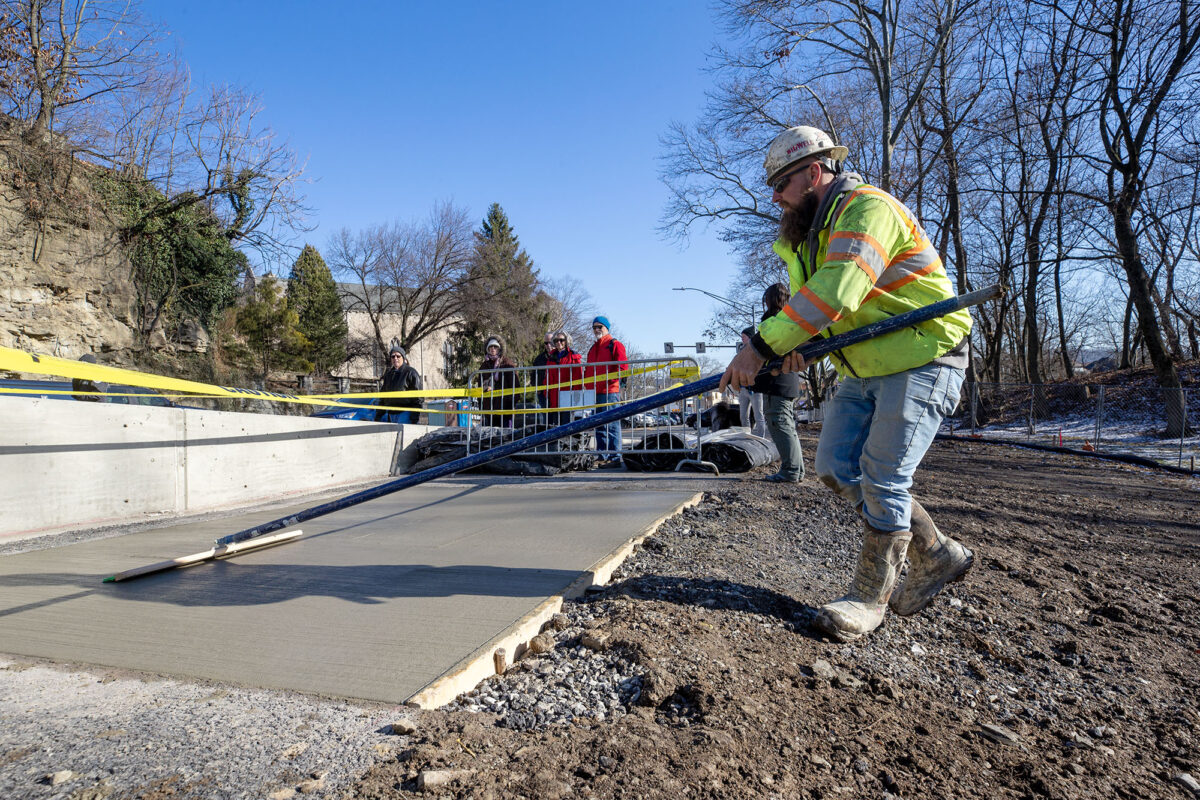Gov. Josh Shapiro’s administration hasn’t developed its comprehensive program for funding transportation in the future, but it appears to be moving away from former Gov. Tom Wolf’s proposal for delivery fees and ride-hail payments to eliminate the gasoline tax.
Acting Department of Transportation Secretary Mike Carroll testified during a state House Appropriations committee hearing last week that the department is concentrating on making sure it has matching money available to take advantage of billions of dollars available under President Joe Biden’s infrastructure program. The department realizes that all states that rely on gasoline taxes for road and bridge funds will have to find other sources of revenue because of the growth in electric vehicle sales and increasing efficiency of vehicles that use gasoline, Carroll said, but that doesn’t have to happen immediately.
Carroll’s testimony during the PennDOT budget hearing Thursday is the first indication of the agency’s priorities under Shapiro, who took office in January. Carroll has been reluctant to do interviews before his nomination as transportation secretary is considered by the state Senate in mid-April.
In his last year in office, Wolf called for a comprehensive overhaul of transportation funding that included the elimination of the gasoline tax and backed a bipartisan committee’s call for new fees on package deliveries and trips in Uber or Lyft vehicles. Those fees would make up for stagnant or declining gas tax revenue until the state could develop systems to generate revenue from electric vehicles and switch to a fee for miles driven for all drivers.
The state gets about 78% of its transportation money from the 61.1-cent gasoline tax, one of the highest in the country.
“The revenue from the gas tax will decline,” Carroll testified. “We’re going to have to address that. That will be a very complicated conversation.
“Those are going to be very big numbers [from the gas tax] that will have to be made up. Fortunately, we’re not there yet.”
For now, Carroll said, the new administration is concentrating on making sure Pennsylvania gets as much of the federal infrastructure money as it can.
Under the federal program, the state is automatically eligible for $4.1 billion in additional federal funds over five years. Carroll said that means the department will need about $442 million more in its budget to cover the state’s share.
In his budget address, Shapiro recommended that the state get that money by transferring $100 million a year for the next five years in costs for state police out of the Motor License Fund, reducing the PSP money by $500 million the last year. That money, which has been used for police patrols on state roads, will be paid out of the state general fund budget if the General Assembly approves the change.
That transfer would generate $1.5 billion in extra road funds, about $1 billion more than is needed for the required match of guaranteed federal funds.
However, Carroll pointed out that the Biden program also includes billions more in competitive grants for road, bridge and other transportation-related projects such as the grant that Pittsburgh recently received to help reconnect the Manchester and Chateau neighborhoods on the city’s North Side. The state has dozens of additional projects that it will apply for that also will require a 20% match.
“We want to get as much of that money as we can,” Carroll said.
Under Wolf’s administration, PennDOT claimed its annual budget of about $7 billion a year was about $8 billion below what the department should have been spending to keep up with road and bridge projects. Spokeswoman Alexis Campbell said after the hearing that there are still many unmet needs, but the new administration hasn’t put a dollar figure on that yet. PennDOT also hasn’t developed an alternate funding proposal, she said.
“At this point, our focus is on securing the federal funds,” she said. “We’re here for conversations around any and all solutions. It really is the General Assembly that will make the ultimate decision.”
Not everyone on the Appropriations Committee agreed with Carroll’s vision to acquire as much federal money as possible for additional projects. State Rep. Eric Nelson, R-Hempfield, said the state should substitute the federal money for state funds and reduce the gasoline tax rather than do additional projects.
“It seems like we’re going to miss an opportunity here,” Nelson said.
In other areas, Carroll said he expects discussion with legislators over the summer to determine how to approach charging owners of electric vehicles, who don’t pay the gasoline tax. The state will have to balance the benefits of promoting electric vehicle sales — a key component of Biden’s infrastructure plan — with the need for road funds, he said.
The state expects to install about 150 charging stations across the state over the next five years using $171.5 million in federal funds. Biden wants to have charging stations available every 50 miles on major roads to encourage electric vehicles to make up at least half of the vehicle sales market by 2030.
One other key area Carroll touched on is expanding the share of road and bridge work done by minority and women contractors.
“We can do better, and we will do better,” Carroll said. “We need to up our game. The numbers need to improve.”
Nicole Tyler, the department’s director of equitable transportation, said the department has developed a mentor/protege program to pair new businesses with veteran contractors to teach them how to qualify for state work, holds workshops for new businesses, and will meet individually with new businesses to help them understand state procedures.
“We really are trying to meet people where they are and help them as much as we can,” she said.
Ed covers transportation at the Pittsburgh Post-Gazette, but he's currently on strike. Email him at eblazina@unionprogress.com.



